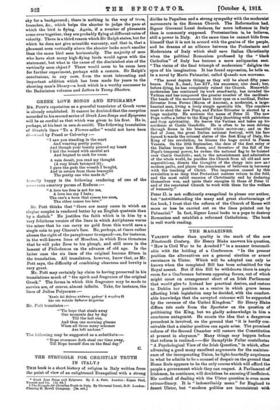GREEK LOVE SONGS AND EPIGRAMS.* POTT'S reputation as a graceful
translator of Greek verse is already established. It cannot be doubted that the reception
accorded to his second series of Greek Love Songs and Epigrams will be as cordial as that which was given to his first. He is, perhaps, at his best in vers de societe. The following translation of Strata's lines " To a Flower-seller " would not have been di -( ,%% lied by Praed or Calverley :—
" I saw you standing in the mart
And weaving pretty posies, And though your beauty pierced my heart I hid the wound with careful art And feigned to seek for roses.
A vain deceit, you read my thought (A rosy blush betrayed it); I gave the gods the wreath I bought, And in return from them besought The pretty one who made it."
l•..m.tily happy is the following rendering of one of the rep,. roils amatory poems of Rufinus " A love too free is not for me, A love too coy I hate ;
The one's a boon that comes too soon.
The other comes too late."
Mr. Pott thinks that "there are many cases in which an elegiac couplet is rendered better by an English quatrain than by a distich." He justifies the faith which is in him by a very felicitous version of the lines in which Antiphanes warns the miser that be can carry no gold from this world save a single coin to pay Charon's fare. He, perhaps, at times rather abuses the right of the paraphraser to expand—as, for instance, in the well-known lines of Moschus, in which Eros threatens that he will yoke Zeus to his plough, and still more in the lament of Philodemus on the advance of old age. In the latter case the six lines of the original become fifteen in the translation. All translators, however, know that, as Mr. Pott says, the difficulty of combining clearness and brevity is
very great.
Mr. Pott may certainly lay claim to having preserved in his translations much of " the spirit and fragrance of the original Greek." The forms in which this fragrance may be made to survive are, of course, almost infinite. Take, for instance, the lines of Julius Polyaenus
ad SuSrou icAbrrei xp4voy• wundrn ivies r.:tr woAAds rOcco-ev turxohlas Mr. Poll translates :— " 'Tis hope that steals away Our moments day by day
Till the last sun, And then one morning gleams When all those many schemes Are left undone."
The following may be suggested as a substitute:—
" Hope evermore doth steal our time away, Till Hope herself dies on the final day."
C.


































































 Previous page
Previous page